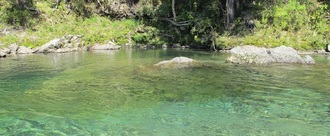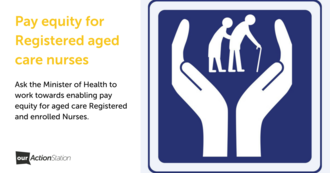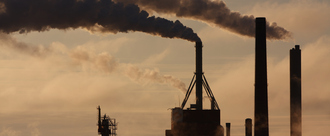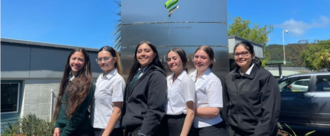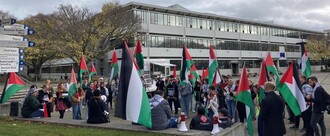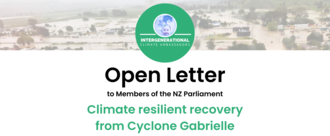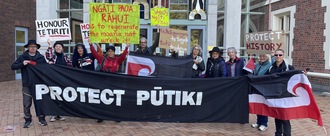Search result for "New Plymouth ".
-
Stop work on the Waimea Dam, consider sustainable and affordable alternativesWe ask the Council to not approve the Waimea Dam project. We urge the Council to engage with ratepayers, and properly cost and consider alternatives to the Waimea Dam that are more sustainable and affordable. We the undersigned do not support the proposed Waimea dam.474 of 500 SignaturesCreated by Jon Pawley

-
Pay equity for aged care NursesI am asking for your help and support in bringing the issue of pay disparity into the spotlight, and work towards increasing health funding to the aged care sector to enable pay equity for aged care Registered and enrolled Nurses.2,448 of 3,000 SignaturesCreated by Sarah Blackstock
-
Don't Subsidise Pollution: End Free Carbon CreditsEnd free carbon credits. Cut pollution. Unlock green jobs. We call on the Minister of Climate Change and Cabinet to: 1. End free carbon credits: accelerate the phase out of free industrial allocation in the Emissions Trading Scheme to end free credits by 2030. 2. Cut pollution: use funds generated from ending free credits to contribute to the upfront costs of decarbonising emissions intensive industries (in the form of loans or in return for equity stakes). 3. Unlock green jobs: protect jobs with a Carbon Border Mechanism (like the EU is introducing), green infrastructure investment via a Ministry of Green Works or public procurement, and fund a just transition for any affected workers.6,222 of 7,000 SignaturesCreated by Common Grace Aotearoa
-
Police bias at Pūtiki Bay marina developmentProtect Pūtiki call on the Commissioner of Police Andrew Coster to initiate an inquiry into the police operation at Kennedy wharf, Pūtiki Bay on Thursday 15th July and the ongoing/increasing police presence at Pūtiki.4,614 of 5,000 SignaturesCreated by Nââwié Tutugoro
-
Rangatira ai te Whare PāremataSign this petition if you believe that the budget should be redistributed to accommodate, support and celebrate indigenous needs and excellence. We support the Māori Party Toi Māori policy to make sure that Te Matatini the Māori performing arts competition receives equal funding to Ballet and classical musical.141 of 200 SignaturesCreated by Essta Faitele
-
Stop the Waerenga industrial meat chicken farmWe want the Waikato Regional Council to decline a resource consent application by Buchanan Ellis Ltd to build an industrial meat chicken farm at 69 Kelly Road, Waerenga.1,557 of 2,000 SignaturesCreated by Direct Animal Action

-
Have your say on the Christchurch Stadium to save the climateThe Christchurch City Council wants to know what you think about investing extra money into Te Kaha - Canterbury’s multi-use arena (Stadium). Have your say at Te Kaha multi-use arena budget consultation: https://ccc.govt.nz/the-council/haveyoursay/show/514 Update: Thank you to all those who made a submission and/or signed this petition. Initial analysis shows 23% are against pushing on with the project. Though not ideal, it should be enough of a split to allow councillors to make their own decisions. The numbers may suggest one in four ratepayers are against the Council investing the additional money, which is significant, and more so given they will be forced to help pay for it.27 of 100 SignaturesCreated by Wiremu Thomson
-
Massey University: Divest from GenocideWe demand that Massey University takes the following principled actions: 1. Divest immediately from all investment in Israeli Government Bonds, and commit to the creation of a policy to avoid such investment in the future. 2. Fully disclose the nature and value of any and all other investments in the Israeli Government, Israeli companies, companies identified by the BDS movement, and/or weapons and other military equipment manufacturers and suppliers. 3. Fully disclose all research collaborations with Israeli universities, institutions and companies, with weapons and other military equipment manufacturers and suppliers, and with companies identified by the BDS movement. 4. Encourage all academics to observe the guidelines of the Palestinian Campaign for the Academic and Cultural Boycott of Israel (PACBI) and coordinate academic aid efforts directly with Gazan universities to ensure the long-term resilience and sustainability of Gaza’s higher education system, as requested by Gazan academics. 5. Take seriously your obligations to Indigenous students as a supposedly Te Tiriti led university. This means fortifying pathways that engender Māori student excellence and further increasing opportunities and resources that engender all Indigenous student excellence, particularly facilitating scholarships and study opportunities for Palestinian students. 6. Heed the following demands already made by student protesters across Aotearoa to: 1. Declare and recognise Palestine as an independent and sovereign state; 2. Denounce anti-Semitisim, Islamophobia, and all forms of discrimination; 3. Engage in good faith with student protesters and refrain from calling the police on student protests 4. Release a statement in solidarity with Palestine condemning Israel’s genocidal actions against Palestinians, acknowledging Israel’s war crimes over 76 years of occupation, and calling for an immediate ceasefire and end to illegal occupation. It is in Massey's strategic plan that global social and economic divides, fractured interstate relationships, ongoing economic and humanitarian crises, strained health systems, and security threats as issues experienced globally are listed as requiring “universities such as Te Kunenga ki Pūrehuroa Massey University [to] step forward and address the complexities those issues present.” We are demanding that you follow through on your words and align Te Kunenga ki Pūrehuroa Massey University’s practices with these principles. We are demanding that you put your money where your mouth is.543 of 600 SignaturesCreated by Massey SJP
-
Open Letter: Climate resilient recovery from Cyclone GabrielleTo the Members of the New Zealand Parliament, We begin this letter by acknowledging the whānau and communities who’ve lost loved ones, and had their lives turned upside down at the hand of climate change; in the form of the intensity of Cyclone Gabrielle. Right across Aotearoa, we’ve seen people mobilising in support of those in need in Auckland, Hawke’s Bay, Tairāwhiti Gisborne and Te Tai Tokerau Northland - and what a heartwarming thing that is. We’ve been presented with the reality of having to rebuild entire communities, which comes with the opportunity to right wrongs, do things differently and catalyse climate solutions and resilience. It would be a mistake to emerge from this Cyclone still clinging to the past. Unless we want to hand over a world with an unstable climate, rising temperatures and a polarity of extreme weather events, business as usual is no longer an option. Future generations are relying on us to act, urgently and transformationally. We hope you feel the need to be a good ancestor and guardians for future generations, and thus act with this in mind. We hope you see and feel the momentum across Aotearoa for bold, ambitious climate action. We hope you know many people will be basing their vote in this year’s general Election on just that. This will be the Climate Election. So we urge you to invest in a better future, not a bigger failure. Investing in a better future would see you prioritising: Climate-resilient development. Climate-resilient development integrates smart adaptation measures with mitigation to advance sustainable development for all. The 2022 IPCC report noted the urgent need for climate resilient development and that climate resilience is possible when governments make decisions in equitable and inclusive ways and work in partnership with Indigenous Peoples, local communities, the private sector, science bodies and traditionally marginalised groups, including women, youth, disabled communities and ethnic minorities The baking in of mitigation, and accountability to reduce emissions, into all infrastructure projects. Cutting emissions is the most effective mechanism to address the potential for more frequent and ever-intensifying events of this nature. Participatory democracy. The awareness and popularity of Citizens Assemblies is growing globally. Citizen assemblies typically involve a process of education and deliberation, which allows participants to learn about the issue at hand and engage in constructive dialogue with others who may hold different perspectives. This process can lead to more thoughtful and nuanced decision-making, as well as greater public understanding and education of complex issues. The Climate Change Commission stated in its advice on emissions reduction; We recommend that the Government commit to evolving more effective mechanisms to incorporate the views of the public when determining how to prioritise climate actions and policies to meet emissions budgets, to create more inclusive policy development. Listening to the indigenous voices that are too often excluded from the conversation. Colonial systems and values are at the root of the climate crisis so Mātauranga Māori and indigenous knowledge need to be at the forefront of our response to climate change. For millennia, Indigenous communities have lived in harmony with Papatūānuku. The Māori value of kaitiakitanga must guide our actions going forward. We need to be working with the planet, not against it. It is crucial that we collaborate with iwi, hapū and our Pacific neighbours to create a ‘new normal’ that benefits all people and the planet. Land use planning as a tool to both mitigate and adapt to the climate crisis. By carefully planning land use including infrastructure, we can reduce emissions eg. reducing the need for long commutes, thus reducing our faster rising sector of emissions; transport. It is vital that we commit to expanding and enhancing low-carbon transport networks, such as active and public modes, and their accessibility both physically and price-wise to catalyse a mode-shift. Additionally, it can facilitate the use of renewable energy sources, such as solar and wind power, while also allowing space for and valuing wetlands and other nature based solutions. Identifying land which is prone to flooding, slipping and coastal erosion and inundation must also inform decisions on how such land is used. The building of resilience. Community resilience is not just about responding to disasters, but also about building sustainable communities that can thrive in the face of the climate crisis. This involves reducing our carbon footprint, enabling sustainable practices, and creating more resilient infrastructure - including social infrastructure.122 of 200 SignaturesCreated by Intergenerational Climate Ambassadors
-
#ProtectPūtikiWe, Uri o Ngāti Pāoa, are currently occupying the beach at Pūtiki Bay (Kennedy Point), Waiheke Island. We are occupying to protect our ancestral moana, Tikapa Moana, by stopping the proposed ‘Kennedy Point Marina’. Many Uri o Ngāti Pāoa (descendants of our iwi) have returned to Waiheke to occupy and have been here since March the 9th, 2021. We are committed to staying indefinitely. We, the undersigned, support the three asks of Uri o Ngāti Pāoa: ✪ We call on Auckland Council to instigate a review of the resource consent given by Auckland Council for the marina at Kennedy Point/Pūtiki Bay (under s128(1)(c) RMA). ✪ We call on Auckland council, the Minister for the Environment; and Minister for Conservation/Acting Minister of Conservation to mandate a process that will enable all affected parties to come up with an outcome everyone can live with. ✪ We call on the Minister for Conservation/Acting Minister of Conservation; to amend the Hauraki Gulf Marine Park Act 2000 to prohibit any future marinas on Waiheke Island. ⭑⭑⭑ Ko Tikapa te moana. Tikapa is the moana we whakapapa to. We are occupying to protect our whakapapa connections. We are occupying to protect our ancestral moana from a mega-sized marina with unprecedented features, such as New Zealand's first floating car park. We are occupying to further express the battle of the Ngāti Pāoa Trust Board, the Waiheke community and SKP (Save Kennedy Point) who have pursued legal avenues to oppose the marina and protect the environment for 4.5+ years. We are all people living in the environment here in Aotearoa/ New Zealand, and we stand in solidarity under the kaupapa of protecting the moana that nourishes and connects us all. As Uri/descendants of Paoa, we are whānau and hapū reconnecting with Waiheke Island (Te Motu Arai Roa), with our ancestral stories, with our mātauranga. We are whānau and hapū growing relationships with the Waiheke Community whose ongoing fight for environmental advocacy and protection we admire. We will continue insisting on the protection of the environment we all share. We unanimously ask that these connections and mātauranga are acknowledged and respected through being given the chance to come to light at an environment court. The RMA (resource management act) provides an opportunity for all Māori to have a voice. The developer says we have had this opportunity. We say that is wrong. If more Uri o Ngāti Pāoa had been allowed a voice in the consideration of this consent, then a fuller picture would have been demonstrated. We ask that an opportunity is granted for this full picture of our mātauranga to be heard. In 70 days of occupation, a significant amount of Ngāti Pāoa people and their stories have come back to Waiheke. Some have never been here on their ancestral land. Some have been here a few times. Some grew up here. In all cases, we share the desire to reconnect to the places we have been displaced from. The reality of the impacts of colonisation and displacement of our whānau, hapū and iwi has meant that our people, their mātauranga and stories connecting us all to place have become scattered and fragmented. However, the mātauranga still exists and has been resurfacing and regathering during the occupation. Many people of Ngāti Pāoa are adamant that the proposed marina is a threat to our ancestral moana, a threat to our whakapapa. It is this threat that unifies us with urgency. The return of our people to our ancestral homeland has brought a deeper, richer level of our mātauranga to light. The mauri and mana of our mātauranga which is yet to be heard by the Court has been reinvigorated through the occupation at Pūtiki. There are now many more Uri o Ngāti Pāoa ready to advocate for our rights armed with the ancestral knowledge to advocate for our taiao/ environment. This expression of mātauranga has become possible in our context by having the time to reconnect and regather through the continuing occupation. We are asking that Auckland Council and the Minister respect the realities of colonisation on our people by providing an opportunity for our mātauranga that is now being called back to Pūtiki to be heard.28,506 of 30,000 SignaturesCreated by Protect Pūtiki


